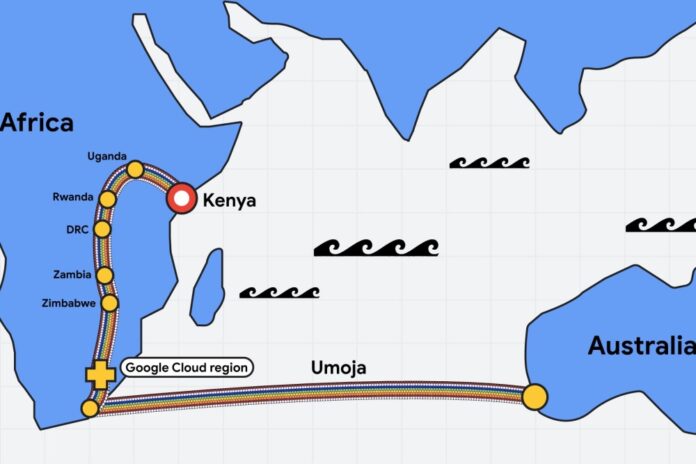The company announces additional cybersecurity collaboration with the government of Kenya
Google continues its investment in Africa with the undersea cable, Umoja, to directly connect Africa and Australia. Umoja is Swahili for unity.
The cable will start on a terrestrial route, starting in Kenya, then crossing Uganda, Rwanda, the Democratic Republic of Congo, Zambia, Zimbabwe and South Africa before traversing the bed of the Indian Ocean and landing in Australia (see graphic provided by Google).
Google opened its first sub-Saharan African office in Nairobi in 2007. From that base, it has partnered many African governments on various digital initiatives. In 2021, Google pledged to invest $1 billion in Africa over five years on initiatives to improve connectivity, invest in startups and help the continent’s digital transformation.
The company has invested more than $900 million so far and says it expects to achieve its investment target by 2026.
Power of partnerships
Umoja’s overland route was constructed in partnership with Liquid Intelligent Technologies (LIT), a subsidiary of Cassava Technologies. The pan-African network operator and techco has a presence in 21 countries, mostly in sub-Saharan Africa. Its fibre broadband infrastructure spans more than 110,000 km.
It also provides wholesale cloud and cyber security solutions to public and private enterprises and SMEs via strategic partnerships with global players.
Strive Masiyiwa, Chairman and Founder of LIT, was quoted in a blog by Google’s Brian Quigley, VP, Global Network Infrastructure, Google Cloud, stating” “Africa’s major cities including Nairobi, Kampala, Kigali, Lubumbashi, Lusaka, and Harare will no longer be hard-to-reach endpoints remote from the coastal landing sites that connect Africa to the world.
“They are now stations on a data superhighway that can carry thousands of times more traffic than currently reaches here. I am proud that this project helps us deliver a digitally connected future that leaves no African behind, regardless of how far they are from the technology centres of the world.”
Agreement with Kenya
Google has announced a second major project: it will sign a Statement of Collaboration with Kenya’s Ministry of Information Communications and The Digital Economy. The plan is to accelerate joint efforts in cybersecurity, data-driven innovation, digital upskilling and “responsibly and safely deploying AI for societal benefits”.
As part of the collaboration, Kenya’s Department of Immigration & Citizen Services is evaluating Google Cloud’s CyberShield solution and Mandiant expertise to strengthen itseCitizen platform. CyberShield is designed to help governments build cyberthreat capabilities, protect web-facing infrastructure and help teams develop skills and processes for security operations.
According to a report by the International Finance Corporation of Washington DC, cited by Google, between 2021 and the end of 2023, the company’s products and services provided more than $30 billion in economic activity across sub-Saharan Africa.
Africa’s internet economy has the potential to grow to $180 billion by 2025, equivalent to 5.2% of the continent’s GDP, according to the same analysis.



